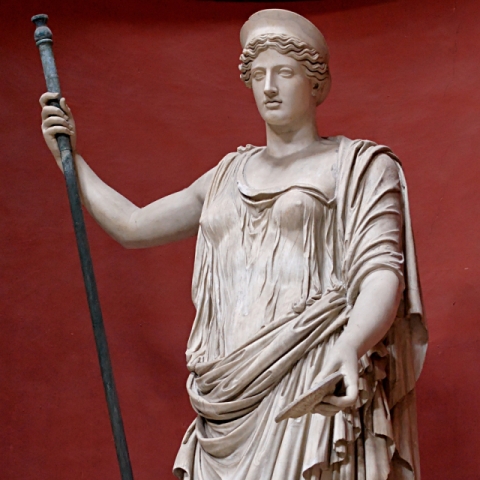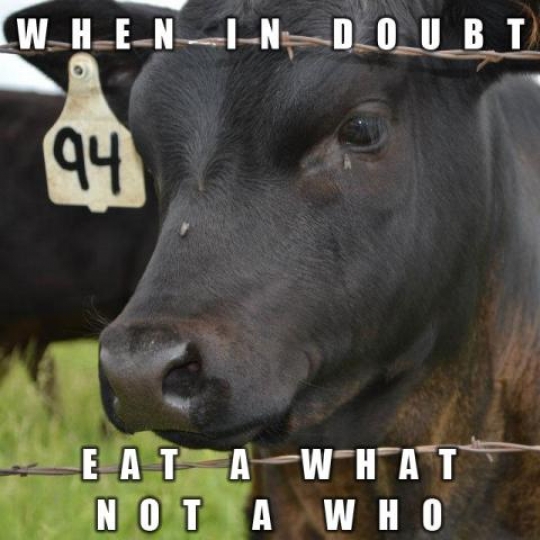It’s the harvest season and my garden seems to be slowing down. This has been my first season gardening and I’ve been thinking a lot about Demeter, the cycles of the Earth, and our place in all of that. In fact a good part of this post was inspired by a gardening comment I left on one of Michelle’s posts and conversations I’ve had about it.
In the comment I talk about the spiritual experience gardening has been for me, and since it’s a response to a blog about Pagans and food, I mentioned veganism. I really do think veganism is a logical extension of common Pagan values of non-harming, loving the Earth and our bodies, and love of liberty.
When talking about veganism with Pagans, one of the most common things that comes up is the relationship between predator and prey.
Predator and Prey
In a discussion spurred by my comment on Michelle’s blog, a friend brought up rabbits. Rabbits breed really fast. A good number of rabbits from each generation are likely to be eaten by predators. If they didn’t breed so much, likely the species couldn’t continue. However, if there were no predators around, rabbits, like humans and many other species, would continue to breed until they outstripped their resources. Then there would be massive starvation. Where death by a predator is gruesome, terrifying, and hopefully quick, death by starvation is slow and miserable.
One of the things vegans most often get asked is what we think of lions. Are they moral to eat other animals? Should they stop? Should we stop them? A lot of the time this is disingenuous but not always.
First of all, I don’t think lions have a moral understanding in the same way humans do. They have a conscience and social values, which are important for any social species, but usually that doesn’t extend to treatment of others outside the species. The moral circle of most species is probably small. That’s also been true of humans for a large part of our history. So I wouldn’t call a lion immoral for eating a gazelle, because they likely aren’t violating any moral concept they’re familiar with. That makes them amoral, not immoral. Doesn’t really make a difference to the antelope, I imagine.
If I’m wrong and they are capable of moral reasoning? I’m still not volunteering to have that conversation with a lion.
Cats, including lions, are obligate carnivores. They can’t give up meat and still stay healthy. Again, that’s probably meaningless to an antelope who’s being chased.
That leaves the question of stopping them. Should we stop lions? There are plenty of amoral humans who are going about satisfying their needs, and that doesn’t stop us from arresting them if those needs or desires come at someone else’s expense. So what happens if we stop lions?
The gazelles suffer more. They overpopulate and starve. No one is helped if we interfere in the relationship between predator and prey. What does all this have to do with humans? Little to nothing. We aren’t in their situation. We are capable of moral reasoning, we don’t need to eat meat, and we provide zero service to animals as predators because we aren’t predators. We farm them.
We don’t keep animals’ population within manageable limits by preying on them, because we treat them not as prey, but as crops. We forcibly inseminate cows, raising them in such numbers that it’s wreaking havoc in the environment. Eating meat is the single largest human cause of climate change. More than your car, more than power plants. Up to 51% of all greenhouse gas emissions come from raising livestock. This isn’t the activity of a predator keeping things in check.
If true predators gave up meat, it would cause horrible suffering and unbalance the web of life as we know it. If humans gave up meat, it just might restore balance and, if we’re lucky, avert or lessen the climate apocalypse that’s brewing. I wouldn’t tell you to go vegan anymore than I would tell a lion, because people don’t like being told what to do. I certainly don’t like it. But I will speak up about what’s happening in the world. We aren’t predators, we aren’t preventing overpopulation, and the human taste for meat might destroy our civilization.
Natural Law
I find it fascinating and repellent that lifeforms eat each other in order to survive. Well, plants don’t. Not usually. It's part moral horror and partly my irrational desire to be an island unto myself. My physical boundaries are far more permeable than I find entirely decorous. We are constantly exchanging air with our environment, absorbing and releasing water to be evaporated, eating and drinking and expelling the remnants in a multitude of ways. We aren’t separate from the world around us; we’re like colanders in a river, with the stuff of the world constantly flowing through our bodies.
Contemplating the power of true predators, the defenses animals have developed against predators, and the way animal communities have established a predation equilibrium fills me with awe. The way life and death are entangled, dependent upon one another, is one of the ways our world is amazing in its imperfection.
This awe has spiritual implications. It informs the way I look at Gaia, Demeter, Persephone, Artemis. But this glorification of the natural world takes a dangerous turn when we start talking about natural law. Much of the “but I’m just like a lion” argument comes back to natural law, which is the idea that to do what’s natural is to do what’s right. One of the common things people say in response to veganism is that it’s natural for humans to eat meat – it’s our right, our duty, and our proper place in the web of life.
It smacks of religious ethics, also called Divine Command Theory. Now I like religion a lot. I love God so much that I decided to worship a bunch of them, but it gets squicky really quick when people start saying God commanded them to do unpleasant things unto others. This, ultimately, isn’t any different from saying Nature commanded you to do it.
"Goddess/evolution put them here for us to eat." "It's their role in the food chain." The food chain isn’t a moral authority and it doesn’t describe who humans are or should be. It doesn’t describe who cows are or who they should be to us. It’s merely a description of the behavior of different species. Who eats what.
I think we’re in danger of misunderstanding what Nature is.
There's nothing ultimately unnatural in the world. Not even plastic. It's all exploded stardust that has formed into different things. Long before plastic existed, or humans to make it, there was lignin. Lignin is a wholly natural plant polymer that, at one time, nothing in the world could digest. It piled up around the world, much like plastic does today, until eventually fungus evolved that could digest it. Lots of things were probably terrible and poisonous until we evolved to handle them.
Nature isn’t something static. It’s not something we are, or can be, separate from. It’s the web of interactions among different communities of plants and animals. It’s the geological and weather systems. It’s the sun blazing in space. It’s the amazing push to keep surviving, to adapt to terrible circumstances, and it’s the terrible circumstances too.
Nature isn’t an office building with job titles. There is no special place in the food chain, or web of life, that we were put here to fill. The food chain was not designed from the top down; it has evolved from the bottom up. Lignin was once a toxic buildup; now it’s a food source. Whales swim in water, when once they walked on land. That’s why I don’t believe there’s any particular place Nature has destined us to be. Nature is not a rulebook for human behavior.
When we say x is natural for humans, it often just means that our ancestors did x. That doesn’t mean that what our ancestors did was necessarily the best thing, and even if it was, it doesn’t mean it’s the best thing under our current circumstances. I’d much rather focus on what’s best for everyone than on what my ancestors did. Which brings me to:
"We evolved to eat meat."
To that I say: evolution is not a mandate or a license. I also say no we didn’t. We evolved to tolerate meat, but not to thrive on it. The best film I’ve seen on this subject, to date, is Forks Over Knives. You can see a trailer at the official website or watch a longer clip here.
I think invoking evolution as a justification also shows a skewed understanding of what evolution is.
Evolution is not something that happened in the past. A lot of us view it a lot like the biblical God creating Adam and Eve fully formed, only for we Pagans it's Mother Earth or Father Big Bang that set down the rules for us. The truth is we’re still evolving now. Our choices today affect the future of humanity – what we will eat, how we will live, what our culture will look like. How do we want to evolve our species in the future? I 'spose we could, over time, get to where we thrive on animal products rather than barely tolerate them. We also might get used to ingesting foods stored in plastic, or the multitude of other chemicals we're exposed to every day. I don't think it's worth however many years of suffering that will take. I don’t think it’s worth the inevitable climate disasters. Maybe we can evolve to have a healthy predator relationship with animals, where we actually benefit the species with which we interact. I'd rather just be nice to them or leave them alone. Just sounds easier.
Further Reading
Environmental costs of meat:
http://www.huffingtonpost.com/julia-orr/climate-change-and-the-me_b_5642...
http://www.fao.org/newsroom/en/News/2006/1000448/index.html
http://www.forbes.com/sites/michellemaisto/2012/04/28/eating-less-meat-i...
http://epa.gov/climatechange/ghgemissions/sources/agriculture.html
Health effects of animal products:
http://www.pcrm.org/health/cancer-resources/diet-cancer/facts/meat-consu...
Lignin in perspective:
http://www.worldwithoutus.com/excerpt.html




Leave a comment!